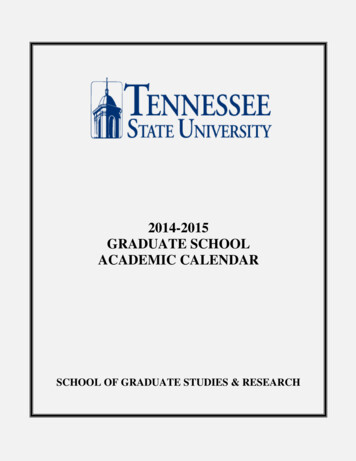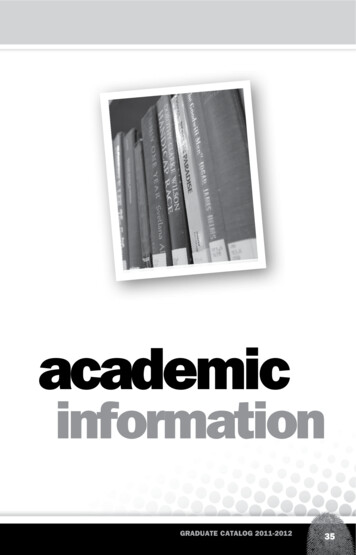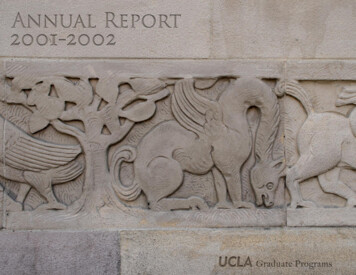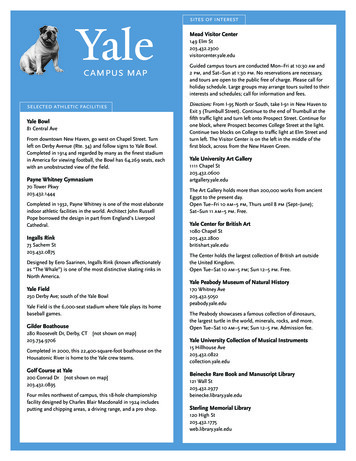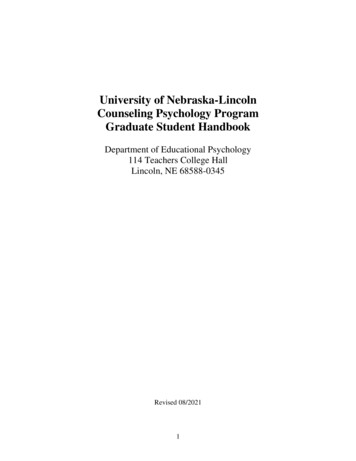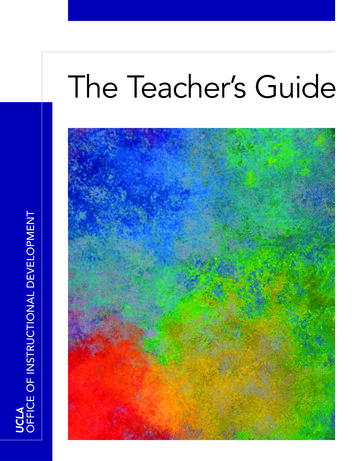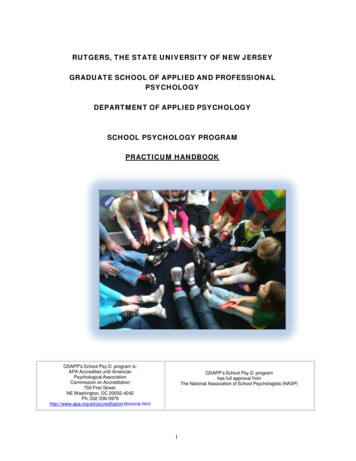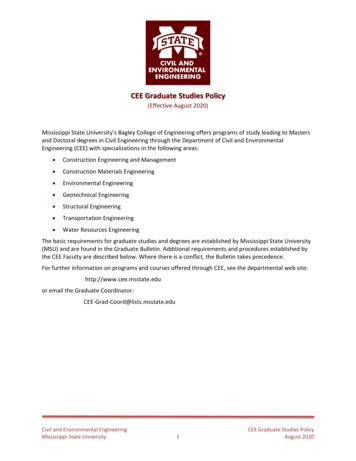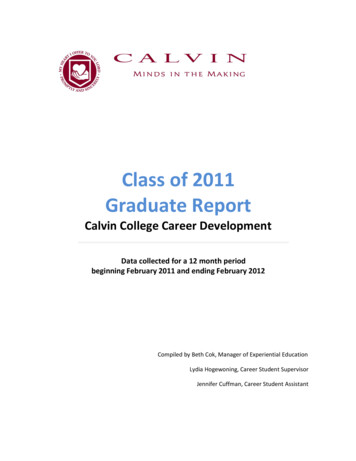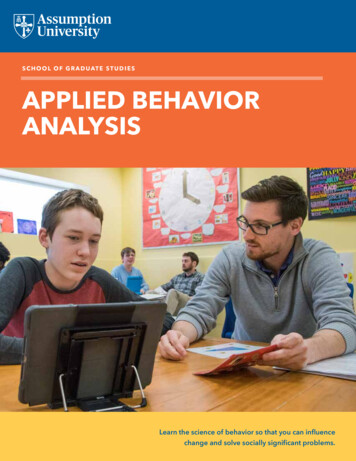
Transcription
S C H O O L O F G R A D U AT E S T U D I E SAPPLIED BEHAVIORANALYSISLearn the science of behavior so that you can influencechange and solve socially significant problems.
Solve Socially ImportantProblems and ImproveOutcomesYour Path toBecoming aBoard CertifiedBehavior AnalystA BOARD CERTIFIED BEHAVIOR ANALYST (BCBA) is an independent practitioner who conductsbehavioral assessments, interprets the results of behavioral assessments, and designs behavioralinterventions for clients in a variety of fields. A BCBA may also supervise BCaBAs (behavior analystscertified at the Bachelor’s degree level), registered behavior technicians (RBTs), and studentswishing to gain supervised fieldwork experience. To become a BCBA, you must hold a master’sdegree, complete a number of graduate courses in ABA, gain up to 2,000 fieldwork experiencehours (with supervision by a BCBA), and pass a certification exam. A BCBA must obtain continuingeducation to maintain certification and, to practice in Massachusetts, must be licensed as an AppliedBehavior Analyst (some exceptions may apply). Assumption’s ABA course sequence meets theBehavior Analyst Certification Board’s (BACB) requirements for eligibility to take the Board CertifiedBehavior Analyst Examination . Applicants may need to meet additional requirements to qualify.MASTER OF ARTS (M.A.) IN APPLIED BEHAVIOR ANALYSISCERTIFICATE OF ADVANCED GRADUATE STUDY (C.A.G.S.)IN APPLIED BEHAVIOR ANALYSISWelcome to the ABA programs at Assumption University. We prepare studentsfor careers as applied behavior analysts. Graduates of our programs will be wellprepared for both clinical and research-based positions. Our programs teachthe science of behavior, which is essential for individuals interested in autism,general and special education, developmental and intellectual disabilities, socialKaren Lionello-DeNolf,Ph.D., BCBA-D, LABADirector, Applied Behavior Analysis programPhone: 508-767-7498Email: k.lionellodenolf@assumption.eduwork and related fields.Distinguishing and Sought-After Features of theApplied Behavior Analysis Programs:Mission Statement A multi-disciplinary focusemphasizes how to use behavioranalytic interventions across thefields of psychology, humanservices, and educationThe mission of the Applied Behavior Analysis Coursework covers both typicaland atypical human development A comprehensive curriculumcovers the applied, experimental,and conceptual branches ofbehavior analysis Fieldwork experience iscoordinated with the courseworkand supervised by BoardCertified Behavior Analysts Students in the MA program havethe ability to pursue either anapplied or research track throughtailored coursework The course sequence is verifiedby the Association for BehaviorAnalysis International and meetsthe requirements to apply to sitfor the BCBA exam Program meets the courseworkand fieldwork requirements forlicensure as an Applied BehaviorAnalyst in Massachusetts Graduates are well-preparedto apply to sit for the BoardCertified Behavior Analyst examAs a graduate of the ABAprogram, you will be positioned toenter a field with increasingly greatdemand. You will have the skillsnecessary to create meaningfulimprovements in the lives of yourclients and their families. We lookforward to accompanying you onthis exciting journey.Programs at Assumption University is to preparestudents to be well-rounded behavior analystswho excel at applying their knowledge of thescience of behavior in a variety of settings.The program accomplishes this throughcomprehensive coursework in the applied,basic, and conceptual branches of behavioranalysis and related fields. We teach evidence-based approaches to assessment and treatmentthat are widely applicable and based on firmlyestablished behavioral principles. The courseworkis integrated with a practicum series to providestudents with multiple opportunities to developcompetencies in skills related to behavior-analyticservice delivery and research. The programteaches students to effectively work with and trainstaff, parents, and caregivers and to collaboratewith other service providers in order to maximizeclient outcomes while remaining in harmony withthe core conceptual and ethical tenants of thefield. As a result, students become adept at criticalthinking and are formed as contributing membersto both the wider discipline of behavior analysisand the communities they serve.
A RewardingHigh-DemandCareerAPPLIED BEHAVIOR ANALYSIS (ABA)is the science of learning and behavior usedin order to solve socially significant problems(to influence changes in behavior that aremeaningful to individuals and those aroundthem). ABA emphasizes the influence of theenvironment in behavior change and involvesdirect observation of behavior, data collectionand analysis, and systematic changes to theenvironment in order to understand the causeof socially significant behavior and improve thatbehavior. By first understanding the cause, weare able to develop more effective, long-lastingand socially acceptable methods of changing ourDiverse Career Path OptionsWith a Master of Arts in AppliedBehavior Analysis from AssumptionUniversity, your career path optionsare diverse. ABA is the only evidencebased intervention available forindividuals with autism spectrumdisorder (ASD). Given the increase inthe number of individuals diagnosedwith ASD, it is likely that most people,in any career, will be requiredto work with or provide servicesfor individuals on the spectrum.Completing coursework in ABA willtherefore be relevant for studentswho will be working with individualswith ASD in a wide variety of settings.The most common association withABA is working with children withASD and other developmental andintellectual disabilities, and ourprograms prepare students to dothat. In addition, there are manyother fields where the interventionsand teaching procedures basedon ABA have an impact. An ABAdegree is relevant in clinicalpsychology,behavioral medicine,counseling, job effectiveness, sportstraining, environmental protection,education, exercise and health,business, criminology, and otherareas. Our coursework emphasizesthe multi-disciplinary nature of ABAand demonstrates how behavioralprinciples can be applied in a varietyof settings.own behavior and the behavior of others.Students graduate with the coursework andfieldwork requirements to apply for licensure asan Applied Behavior Analyst in Massachusetts.in applied, basic and conceptualbehavior analysis and is designed forsupported me in becominga behavioral clinician. Iflexibility to work in a range of settings.assist in creating PositiveWe teach evidence-based approachesBehavioral Support plans thatwidely applicable. Our program has afocus on adults increasingto assessment and treatment that aremultidisciplinary focus, and studentstheir independence andfrom faculty in the Psychology, Humanaccomplishing their goals.”will have the opportunity to learncomplete coursework in both typicaland atypical development.Both the M.A. in ABA and C.A.G.S.in ABA programs at AssumptionUniversity fulfill the current educationaland fieldwork requirements forlicensure as an Applied BehaviorAnalyst in Massachusetts. Moreover,both programs meet the requirementsfor students to apply to sit for the BoardCertified Behavior Analyst exam underthe 5th Edition Task List.ABA 500: Principles of Learning and Behavior Analysis*ABA 501: Measurement and Research Methods inBehavior Analysis*ABA 600: Behavioral and Functional Assessment*ABA 601: Behavior-Analytic Interventions I*classes are held once per week in the evening. The courseworkABA 603: Ethical, Legal and Professional Topics inBehavior Analysis*includes the applied, experimental and conceptual branchesof behavior analysis, so students receive a strong foundationin the science of behavior that will enable them to successfullyABA 604: Conceptual Foundations of Behavior Analysis*ABA 605: The Experimental Analysis of Behaviorsolve problems for clients in diverse situations. The programABA 804: Integrative Seminar in ABAto obtain supervision of fieldwork hours prior to graduation.Behavior-analytic Fieldwork Courses:also includes required practicum classes that will allow studentsStudents interested in gaining research experience can pursue aan Applied Behavior Analyst in Massachusetts and to apply tosit for the Board Certified Behavior Analyst (BCBA) exam underthe 5th Edition Task List. Applicants may need to meet additionalrequirements to qualify.ABA 700: Practicum in Applied Behavior Analysis IABA 701: Practicum in Applied Behavior Analysis IIABA 702: Practicum in Applied Behavior Analysis IIIABA 703: Practicum in Applied Behavior Analysis IVABA 710: Practicum in Applied Behavior Analysis I:Group SupervisionInterdisciplinary Electives (Choose 2):ASD 640: Collaboration and Coordination: AutismSpectrum Disorders ORRCP 530: Introduction to Counseling Theory and PracticePSY 502: Psychology of Development ORSCP 545: Human Growth and Development throughthe Life Span ORSED 563: Developmental Pathways and ChallengesServices and Rehabilitation Studies,and Education departments and toBehavior Analysis Courses:ABA 602: Behavior-Analytic Interventions II*sessions. Two to three classes are taken each semester, and theand fieldwork experience requirements to apply for licensure as“The program challenged andRequired Courses:program. It can be completed in two years, including two summerStudents who complete this program will have met the courseworkstudents who wish to become wellrounded behavior analysts with theThe Master of Arts in Applied Behavior Analysis is a 46-creditthesis option in which they conduct an applied research project.A Well-Rounded Educationthat Gives You OptionsOur program includes courseworkThe Master ofArts in AppliedBehavior Analysis– KATE DIAZ ‘19BEHAVIORAL CLINICIAN,HORACE MANNEDUCATIONALASSOCIATES (HMEA)ABA 503: Behavior Analysis and Intellectual andDevelopmental Disabilities ORASD 600: Foundations and Characteristics of AutismSpectrum DisorderABA 704: Practicum in Applied Behavior Analysis VOptional courses:ABA 800: Pre-thesis Seminar in ABAABA 801: MA Thesis in ABA IABA 802: MA Thesis in ABA IIABA 803: MA Thesis in ABA III*ABAI Verified CourseSequence courseAssumption cannotguarantee that studentssuccessfully completingthe program will passthe certification exam orbecome licensed.
PracticumFieldwork is an essential part oftraining to become an appliedbehavior analyst because it allowsyou to develop the competenciesyou need to accurately assessbehavior and develop successfulinterventions for your clients.Fieldwork experience is gained byworking or volunteering in naturalenvironment settings in which youcan use ABA when working withpeople. One benefit of Assumption’sABA program is that it includesrequired practicum classes thatallow students to obtain supervisionof all of their fieldwork hours priorto graduation. There are certainfieldwork requirements that need tobe met to apply for licensure and tosit for the BCBA exam. These includeworking at a site that allows you towork with more than one person,working a minimum of 20 hours permonth related to behavior analysis;being supervised by a BCBA whohas completed supervisor training,Certificate of AdvancedGraduate StudyFieldwork standard. Assumption’spracticum classes are designedto accommodate either of thesestandards, depending on thestudent’s placement. In some cases,students may need to take additionalpracticum credits to meet fieldworkA Certificate of Advanced Graduate Study (C.A.G.S.) in Applied Behavior AnalysisPracticum courses:ABA 700: Practicum in Applied Behavior Analysis IABA 701: Practicum in Applied Behavior Analysis IIRequirementsABA 710: Practicum in Applied Behavior Analysis I:requirements and is licensed as(elective)Group Supervision (1 credit)an applied behavior analyst inMassachusetts can provide 3–4 hoursof individual supervision per month.The Association for Behavior Analysis Internation-ABA 602: Behavior-Analytic Interventions IIIn addition, you must be able toal has verified the following courses toward thecoursework requirements for eligibility to take thework with multiple clients providingbehavior-analytic services for at least100 hours per month. Students willbe asked to identify a practicumplacement during their first semesterand secure site/supervisor approvalfrom the Program Director. TheProgram Director is available toassist students in identifying anBoard Certified Behavior Analyst Examination and supervisor contacts persupervisory period. Current BACBExperience Standards state that youneed to accumulate 2,000 fieldworkwork hours with 5% supervised hoursunder the Supervised Fieldworkstandard or 1,500 fieldwork hourswith 10% supervised hours underthe Concentrated Supervisedin a coordinated manner and isa significant advantage of ourprogram. During the first semester,a majority of supervision is providedby practicum instructors in additionto on-site supervisors. In subsequentsemesters, supervision is splitbetween Assumption practicuminstructors and on-site supervisors. Application Fee – waived for Assumptionstudentsand alumni Official College Transcript(s) ofundergraduateand graduate recordsdeemed eligible to take the examination.Required Practicum Courses:ABA 700: Practicum in Applied Behavior Analysis I Current resumeABA 701: Practicum in Applied Behavior Analysis II A personal statement indicating your reasonfor interest in the field, an assessment ofpersonal strengths and limitations, and goalsfor graduate studyThe following courses are partof Assumption’s ABAI VerifiedCourse Sequence:students to gain skill in applyingassessments and interventions Graduate Application Three letters of recommendation –professionaland at least one academic*of supervised hours and theanalytic coursework. This allowsABA 604: Conceptual Foundations of Behavior AnalysisYour application file will consist of the following:ABA 804: Integrative Seminar in ABAto meet additional requirements before they can beABA 501: Measurement and Research Methods inAssumption’s practicum coursesABA 603: Ethical, Legal and Professional Topics in Behavior AnalysisYou must possess a baccalaureate degreefrom an accredited college or university togain admission to the Master of Arts program.A minimum undergraduate cumulative GPA of3.0 is required. Candidates for the Certificate ofAdvanced Graduate Study should already holda master’s degree in another field of study froman accredited college or university.The admissions committee takes a holisticapproach to each candidate’s application inassessing their potential to successfullycomplete the graduate program.under the 5th Edition Task List. Applicants will needare aligned with the behavior-minimum number of observationsABA 501: Measurement and Research Methods in Behavior AnalysisABA 601: Behavior-Analytic Interventions Ian LABA in Massachusetts; andreceiving the minimum percentageABA 500: Principles of Learning and Behavior AnalysisCourse Sequence and ScheduleABA 500: Principles of Learning and Behaviorrequirements, and is licensed asRequired Courses:ABA 600: Behavioral and Functional Assessmentappropriate placement.meets the current BACB supervisionABAI Verified Course Sequence), four to five semesters of practicum courses, andABA 703: Practicum in Applied Behavior Analysis IVmust work or volunteer at a clinicalmet the current BACB supervisionto apply for the BCBA exam. The C.A.G.S. consists of seven courses on ABA (thean integrative seminar in ABA.ABA 704: Practicum in Applied Behavior Analysis Vsetting where a BCBA who hasDegree in another field of study and wish to complete the coursework neededABA 702: Practicum in Applied Behavior Analysis IIIrequirements.To participate in practicum, youis a 37-credit program offered to students who have already completed a Master’sAPPLYING TOTHE PROGRAMAnalysisBehavior AnalysisABA 600: Behavioral and Functional AssessmentABA 601: Behavior-Analytic Interventions IABA 602: Behavior-Analytic Interventions IIABA 603: Ethical, Legal and Professional Topics inBehavior AnalysisABA 604: Conceptual Foundations of BehaviorAnalysisABA 702: Practicum in Applied Behavior Analysis IIIABA 703: Practicum in Applied Behavior Analysis IVABA 710: Practicum in Applied Behavior Analysis I: Group Supervision (1 credit) Once the application is complete andforwarded to the program office, the ABAProgram Director may contact the applicant toarrange an interview.* We strongly recommend at least oneacademic letter of recommendation; theremaining letters may be professional oracademic. All recommendations may beprofessional if an academic letter is not feasible.However, all letters should address the student’sability to complete graduate level academic workand may also address the student’s experiencewith ABA-based interventions.For more information about admissionsrequirements and applying, visitwww.assumption.edu/aba
CO U R S E D E S C R I P T I O N S2020-21REQUIRED COURSES:ABA 500: Principles of Learning andBehavior AnalysisThis course provides a graduate-levelintroduction to the key concepts, theoriesand experimental paradigms for studyinglearning and behavior in both humans andanimals. Students will be introduced to thescientific study of learning with an emphasison how behavior changes as a function ofexperience. Historical and current perspectives on a range of topics, including (but notlimited to) classical conditioning, operantconditioning, innate behavior, and philo-sophical assumptions about behavior willbe examined. Finally, how the basic learn-ing principles are relevant to everyday behavior will be discussed. Credits: 3ABA 501: Measurement and ResearchMethods in Behavior AnalysisThis course is designed to teach studentsthe logic of single-subject and small-N de-signs, which are often used to evaluate theefficacy of a behavioral treatment for individual clients. Students will learn reliableprocedures for measuring behavior, variousmethods of displaying (graphing) behav-ior, and how to visually analyze displayeddata. In addition, students will learn how toidentify and develop an applied researchquestion, conduct a literature search, anddesign a single-subject research study toanswer the research question. Issues related to evidenced-based practice and ethicsin research will also be discussed. Credits: 3ABA 600: Behavioraland Functional AssessmentIn this course, students will focus on bestpractices when assessing target behaviorsto both increase and decrease. Students willlearn indirect assessment and direct obser-vation methods, experimental (functional)analysis, and methods to assess stimulusCO U R S E D E S C R I P T I O N S2020-21preference and adaptive, social, and com-tions to behavior of social importanceABA 604: Conceptual Foundationsof behavior-analytic activities including:and implementing interventions. Studentslearn how to assimilate information derivedspectrum disorders, developmental andThis course will provide an introductionand feedback on written behavior plans,behavior-analytic activities, including peermunication skills. In addition, students willfrom these methods to arrive at hypothe-ses of the function of a behavior and howto select an intervention method based onassessment results while using evidencebasedpracticesinbehavioranalysis.Finally, ethical issues related to functionalassessment and undesired side-effects ofintervention strategies will be discussed.Prerequisites: ABA 500 (may be taken concurrently) or permission of the ProgramDirector; Credits: 3This course is the first in a two-part seriesfocusing on the application of behavioralprinciples in applied settings. There will bean emphasis on applications to behavior ofsocial importance across multiple domains,spectrumdisorders,developmental and intellectual ducation, exercise and health, business,criminology, and other areas. Students willlearn to identify, implement, and maintaineffective behavioral interventions basedon behavioral principles of reinforcement,punishment, extinction, stimulus control,and motivating operations. In addition,students will learn specific behavior-changeprocedures, including interventions basedon antecedents, contingency contracts,groupcontingencies,andjob effectiveness, education, exercise andhealth, business, criminology, and other ar-eas. Students will learn to identify, implement,and maintain effective behavioral interventions based on stimulus control, simple andcomplex discriminations, errorless teachingprocedures, and stimulus equivalence. res,specificincludingself-management strategies, token econopersonalized systems of instruction, inci-Interventions Iautismintellectual disabilities, clinical psychology,mies,direct instruction, precision teaching,ABA 601: Behavior-Analyticincludingacross multiple domains, including autismquantitativeanalyses. Prerequisites: ABA 500 andABA 501 (may be taken concurrently) orpermission of the Program Director; Credits: 3ABA 602: Behavior-AnalyticInterventions IIThis course is the second in a two-partseries focusing on the application ofbehavioral principles in applied settings.There will be an emphasis on applica-of Behavior Analysisto the philosophy of behavioral scienceknown as radical behaviorism. Students willlearn how to distinguish between differentforms of behaviorism and how to differenti-ate between behavioral and non-behavioralexplanations of complex human behavior.In addition, the potential impact of radicalevaluate,andsupervisethePrerequisites: ABA 601; Credits: 3ABA 603: Ethical, Legal and ProfessionalTopics in Behavior AnalysisThis course will provide students with anunderstanding of legal, professional, andethical issues in the delivery of behavioranalytic services and the practice ofbehavior-analytic research. Students willdevelop the ability to correctly apply ethicalprinciples under various conditions thatrepresent ethical and/or legal challengesrelated to assessing behavior; selectionoftreatmentprotocols;evaluatingbehavior change; collaborating with otherprofessionals; and relationships with clients,agencies, and colleagues. The BehaviorAnalystCertificationBoard’s (BACB)Professional and Ethical Compliance Codefor Behavior Analysts will be used as thebasis for ethical discussions. In addition,students will review the licensure rulesand regulations guiding the practice ofapplied behavior analysis in Massachusetts.Credits: 3reduction procedures. Prerequisites: ABA500 and permission of the Program Director;must be co-enrolled in ABA 710; Credits: 3Practicum is designed to allow studentshavior, rule-governed behavior, culture, andsociety. Prerequisites: ABA 500; Credits: 3This course will provide students with aimplementation of behavioral programs.role-plays of skill acquisition and behaviorthinking and feeling emotions), verbal be-Topics will include private events (such assystems.design,procedures implemented with clients andABA 701: Practicum in AppliedABA 605: The ExperimentalFinally, students will learn todata sheets, and reports, feedback onbehaviorism on society will be discussed.dental teaching, functional communicationtraining, and augmentative communicationbehavioral case conceptualization, reviewsurvey of research areas in the experimentalanalysis of behavior. Students will beexposed to a variety of topics in the basicliterature related to reinforcement, behaviorin transition, aversive control, stimuluscontrol, and derived relations. There willbe an emphasis on methodological andconceptual issues, and students will discussthe translation of these topics to solve socialproblems. Prerequisites: ABA 500 and ABA501; Credits: 3ABA 700: Practicum in AppliedBehavior Analysis Ireview of class assignments, role-plays ofskill acquisition and behavior reductionprocedures, presentations to refine abilityto speak behaviorally, and review of TaskList items to achieve fluency. Prerequisites:ABA 500 and permission of the ProgramDirector; Credits: 3Behavior Analysis IIABA 703: Practicum in Appliedto develop skills related to the BACB TaskPracticum is designed to allow studentsList. This course provides group supervisionaccording to the BACB Experience Stan-dards. Students will work or volunteer atAnalysis of Behaviorshould expect to complete a variety ofa site in which they can engage behavior-analytic activities with multiple clients.Individual supervision will be obtained atthe student’s fieldwork site. During groupsupervision, there will be a focus on behaviorassessment and behavior-change proce-dures. Students should expect to completea variety of behavior-analytic activities,including peer review of class assignments,role-plays of skill acquisition and behaviorreduction procedures, presentations torefine ability to speak behaviorally, andreview of Task List items to achieve fluency.Prerequisites: ABA 500 and permission ofthe Program Director; Credits: 3Behavior Analysis IVto develop skills related to the BACB TaskList. This course provides group supervisionaccording to the BACB Experience Standards. Students will work or volunteer ata site in which they can engage behavior-analytic activities with multiple clients. Individual supervision will be obtained at thestudent’s fieldwork site. During group super-vision, there will be a focus on selecting andimplementing interventions, case concep-tualization, and personnel supervision andmanagement. Students should expect tocomplete a variety of behavior-analyticactivities, including peer review of classassignments, role-plays of skill acquisitionand behavior reduction procedures, presen-tations to refine ability to speak behaviorally,and review of Task List items to achievefluency. Prerequisites: ABA 500 and per-Practicum is designed to allow students toABA 702: Practicum in AppliedThis course provides individual supervisionPracticum is designed to allow studentsABA 710: Practicum in Applied BehaviorList. This course provides group supervisionPracticum is designed to allow students todevelop skills related to the BACB Task List.accordingtotheBACBExperienceStandards, and students who take thisclass must also be enrolled in ABA 710 (inwhich they will receive group supervision).Students will work or volunteer at a site inwhich they can engage behavior-analyticactivities with multiple clients. Studentswill meet with the instructor individuallyeach week. During individual supervision,students should expect to complete a varietyBehavior Analysis IIIto develop skills related to the BACB TaskaccordingtotheBACBExperienceStandards. Students will work or volunteerat a site in which they can engage behavior-analytic activities with multiple clients.Individual supervision will be obtainedat the student’s fieldwork site. Duringgroup supervision, there will be a focus onbehavior-change procedures and selectingmission of the Program Director; Credits: 3Analysis I: Group Supervisiondevelop skills related to the BACB Task List.This course provides group supervision ac-cording to the BACB Experience Standards,and students who take this class must alsobe enrolled in ABA 700 (in which they willreceive individual supervision). Studentswill work or volunteer at a site in which theycan engage behavior-analytic activities with
CO U R S E D E S C R I P T I O N S2020-21CO U R S E D E S C R I P T I O N S2020-21multiple clients. During group supervision,trum disorder, and learning disabilities. Intween an educational and medical diagno-principles and techniques of the majorety of behavior-analytic activities, includingcurrent issues related to intellectual andfederal special education laws. Credits: 3centered,students should expect to complete a varipeer review of class assignments, role-playsof skill acquisition and behavior reductionprocedures, presentations to refine abilityto speak behaviorally, and review of TaskList items to achieve fluency. Prerequisites:ABA 500 and permission of the ProgramDirector; must be co-enrolled in ABA 700.ABA 804: Integrative Seminar in ABAaddition, students will discuss a variety ofdevelopmental disabilities, including earlyintervention, educational placement, transitioning between life stages, response tointervention, medication use, and fad ther-apies. Finally, students will examine thebehavior-analytic literature related to as-sessment and intervention for individualswith developmental disabilities. Credits: 3This course is designed to integrate con-ABA 704: Practicum in Appliedto behavior analysis. Students will focusPracticum is designed to allow students toceptual, basic and applied topics t in a variety environments, anddevelopment and evaluation of treatmentoptions. Students will be encouraged todevelop sophisticated, fluent, and in-depthunderstanding of behavioral topics. In addition, students will explore professionalissues related to the practice of appliedbehavior analysis. Prerequisites: Permissionof the Program Director; Credits: 3Behavior Analysis Vdevelop skills related to the BACB Task List.This course provides group supervision ac-cording to the BACB Experience Standardsand is an advanced course intended for students who have already completed severalsemesters of practicum. Students will workor volunteer at a site in which they can engage behavior-analytic activities with multiple clients. Individual supervision will be ob-tained at the student’s fieldwork site. Duringsis of ASD and the definition under state andDisorders**This course focuses on building collabora-tive services for students with autism spec-trum disorders (ASD) during school years.The collaborative services include develop-ing an understanding and supporting theroles of other disciplines and professionalswrite their thesis manuscript and defendadolescents with special needs. Credits: 3Prerequisites: ABA 500; ABA 501; Permis-in
Assumption's ABA course sequence meets the Behavior Analyst Certification Board's (BACB) requirements for eligibility to take the Board Certified Behavior Analyst Examination . Applicants may need to meet additional requirements to qualify. Your Path to Becoming a Board Certified Behavior Analyst Karen Lionello-DeNolf, Ph.D., BCBA-D, LABA


